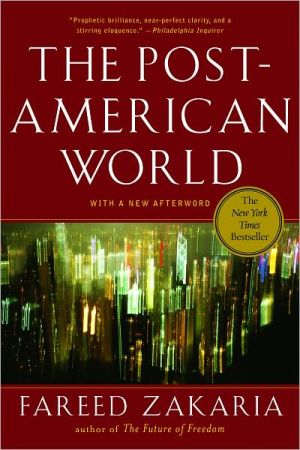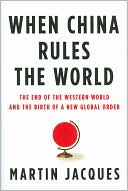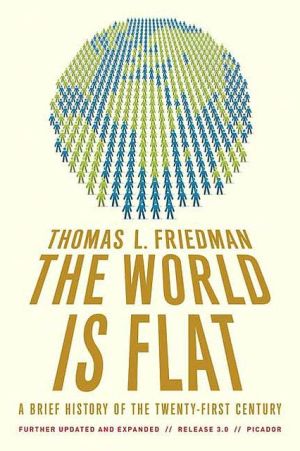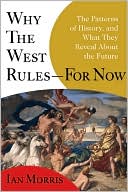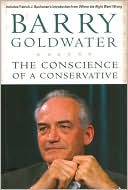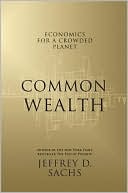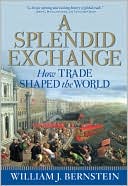The Post-American World
“Zakaria . . . may have more intellectual range and insights than any other public thinker in the West.” —Boston Sunday Globe\ “This is not a book about the decline of America, but rather about the rise of everyone else.” So begins Fareed Zakaria’s blockbusting bestseller on the United States in the twenty-first century. How can Americans understand this rapidly changing international climate, and how might the nation continue to thrive in a truly global era? Zakaria answers these questions...
Search in google:
The New York Times bestseller, revised and expanded with a new afterword: the essential update of Fareed Zakaria's international bestseller about America and its shifting position in world affairs. Publishers Weekly When a book proclaims that it is not about the decline of America but "the rise of everyone else," readers might expect another diatribe about our dismal post-9/11 world. They are in for a pleasant surprise as Newsweekeditor and popular pundit Zakaria (The Future of Freedom) delivers a stimulating, largely optimistic forecast of where the 21st century is heading. We are living in a peaceful era, he maintains; world violence peaked around 1990 and has plummeted to a record low. Burgeoning prosperity has spread to the developing world, raising standards of living in Brazil, India, China and Indonesia. Twenty years ago China discarded Soviet economics but not its politics, leading to a wildly effective, top-down, scorched-earth boom. Its political antithesis, India, also prospers while remaining a chaotic, inefficient democracy, as Indian elected officials are (generally) loathe to use the brutally efficient tactics that are the staple of Chinese governance. Paradoxically, India's greatest asset is its relative stability in the region; its officials take an unruly population for granted, while dissent produces paranoia in Chinese leaders. Zakaria predicts that despite its record of recent blunders at home and abroad, America will stay strong, buoyed by a stellar educational system and the influx of young immigrants, who give the U.S. a more youthful demographic than Europe and much of Asia whose workers support an increasing population of unproductive elderly. A lucid, thought-provoking appraisal of world affairs, this book will engage readers on both sides of the political spectrum. (May)Copyright © Reed Business Information, a division of Reed Elsevier Inc.All rights reserved.
1 The Rise of the Rest 12 The Cup Runneth Over 63 A Non-Western World? 494 The Challenger 875 The Ally 1296 American Power 1677 American Purpose 215Notes 261Acknowledgments 269Index 273
\ From Barnes & Noble"This is not a book about the decline of America, but rather about the rise of everyone else." After this opening reassurance, Newsweek International editor Fareed Zakaria invites us into the "Post-American World" in this updated, revised, expanded edition of his 2008 top-seller. He describes how the growth of countries like China, India, Russia, Brazil, and many others has changed the world in which we American live. No longer will the United States be able to dominate the global economy, orchestrate international geopolitics, or confidently dictate to other nations. But this evolving situation, according to Zakaria, need not be disastrous. He explains how America and Americans can continue to thrive in a post-American world. A generally upbeat assessment of our ever-changing situation.\ \ \ \ \ \ Thomas Friedman - New York Times“Compelling.”\ \ \ SlateA far-reaching analysis.\ \ \ \ \ Joseph Joffe - New York Times Book Review“This is a relentlessly intelligent book that eschews simple-minded projections from crisis to collapse.”\ \ \ \ \ Michiko Kakutani - New York Times“A provocative and often shrewd take that opens a big picture window on the closing of the first American century and the advent of a new world.”\ \ \ \ \ Bruce Nussbaum - BusinessWeek“Fareed Zakaria is one of the most thoughtful foreign policy analysts of our day and his new book . . . is a must read for anyone interested in globalization—or the Presidential election.”\ \ \ \ \ New York TimesA provocative and often shrewd take that opens a big picture window on the closing of the first American century and the advent of a new world.— Michiko Kakutani\ \ \ \ \ New York Times Book ReviewThis is a relentlessly intelligent book that eschews simple-minded projections from crisis to collapse.— Joseph Joffe\ \ \ \ \ BusinessWeekFareed Zakaria is one of the most thoughtful foreign policy analysts of our day and his new book . . . is a must read for anyone interested in globalization—or the Presidential election.— Bruce Nussbaum\ \ \ \ \ Publishers WeeklyWhen a book proclaims that it is not about the decline of America but "the rise of everyone else," readers might expect another diatribe about our dismal post-9/11 world. They are in for a pleasant surprise as Newsweekeditor and popular pundit Zakaria (The Future of Freedom) delivers a stimulating, largely optimistic forecast of where the 21st century is heading. We are living in a peaceful era, he maintains; world violence peaked around 1990 and has plummeted to a record low. Burgeoning prosperity has spread to the developing world, raising standards of living in Brazil, India, China and Indonesia. Twenty years ago China discarded Soviet economics but not its politics, leading to a wildly effective, top-down, scorched-earth boom. Its political antithesis, India, also prospers while remaining a chaotic, inefficient democracy, as Indian elected officials are (generally) loathe to use the brutally efficient tactics that are the staple of Chinese governance. Paradoxically, India's greatest asset is its relative stability in the region; its officials take an unruly population for granted, while dissent produces paranoia in Chinese leaders. Zakaria predicts that despite its record of recent blunders at home and abroad, America will stay strong, buoyed by a stellar educational system and the influx of young immigrants, who give the U.S. a more youthful demographic than Europe and much of Asia whose workers support an increasing population of unproductive elderly. A lucid, thought-provoking appraisal of world affairs, this book will engage readers on both sides of the political spectrum. (May)\ Copyright © Reed Business Information, a division of Reed Elsevier Inc.All rights reserved.\ \ \ \ \ Library JournalAccording to Newsweek International editor Zakaria, the weakened global economic and political position of the United States results not from the waning of its own powers but from the rapid rise of many other global players. The optimistic tone of his previous book, The Future of Freedom: Illiberal Democracy at Home and Abroad, permeates this work. After 500 years of world dominance and following the decline of great states in other parts of the world, the Western powers are seeing countries such as China and India emerge as new and formidable rivals. Zakaria is sharply critical of the current U.S. presidential administration, citing its dysfunctional political stalemate and foreign and military policies that hinder adaptation to the current realities. He argues that it is incumbent upon the Western powers to adapt if they want to thrive instead of trying to reverse these realities, and he remains optimistic that they can change, as they have historically shown themselves able to do so. Zakaria's arguments are accessible to general readers, and his supporting data are not overwhelming to digest. Most libraries will want this. [See Prepub Alert, LJ1/08.]\ —Marcia L. Sprules\ \ \ \ \ \ Kirkus ReviewsPity the poor think-tanked neocons: Just a moment ago, the talk was of empire and the new world order, and now, it seems, America's day in the sun is about to grow cold. Newsweek International editor Zakaria (The Future of Freedom: Illiberal Democracy at Home and Abroad, 2003, etc.), born in India and a longtime resident of New York, seems unconcerned that his adopted country is sailing down the tubes: "This is a book not about the decline of America but rather about the rise of everyone else." He enumerates: Macao takes in more gambling revenue than Las Vegas, the biggest Ferris wheel in the world is in Singapore, Bollywood has surpassed Hollywood. Even as the global population grows, the number of those living in extreme poverty is falling, at least in three-quarters of the world's nations. Even after 9/11, the author notes, the world economy "grew at its fastest rate in nearly four decades." Inflation exceeds 15 percent only in a dozen-odd failed states such as Burma and Zimbabwe, and fewer and fewer people are dying in wars or spasms of political violence than ever. That all should be good news to globalists, and it's comforting to know, as Zakaria helpfully points out, that Iran spends less than a penny for every dollar we spend on the military. Yet the United States has dawdled, economically speaking, as China, India and other nations have skyrocketed. It helps, Indians note, that the Chinese government, the commander of that nation's command economy, hasn't really had to respond to public opinion, though even that is changing. The good news? By Zakaria's account, America's strength will lie in freedom and diversity-and the post-American era may not last all that long, sinceAmerica's population is growing, and growing younger, while the demographics of Asia and Europe are largely pointing to older populations and, in time, fewer workers. A sharp, well-written work of political economy.\ \
